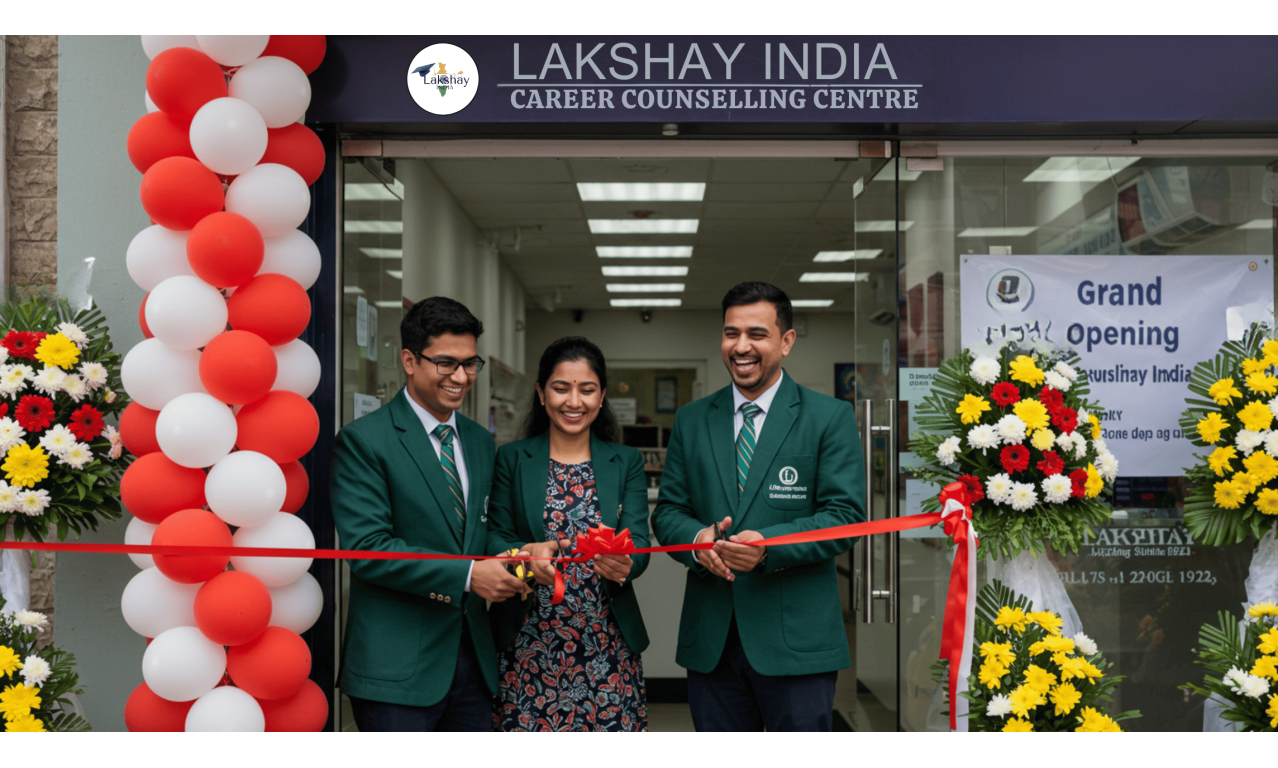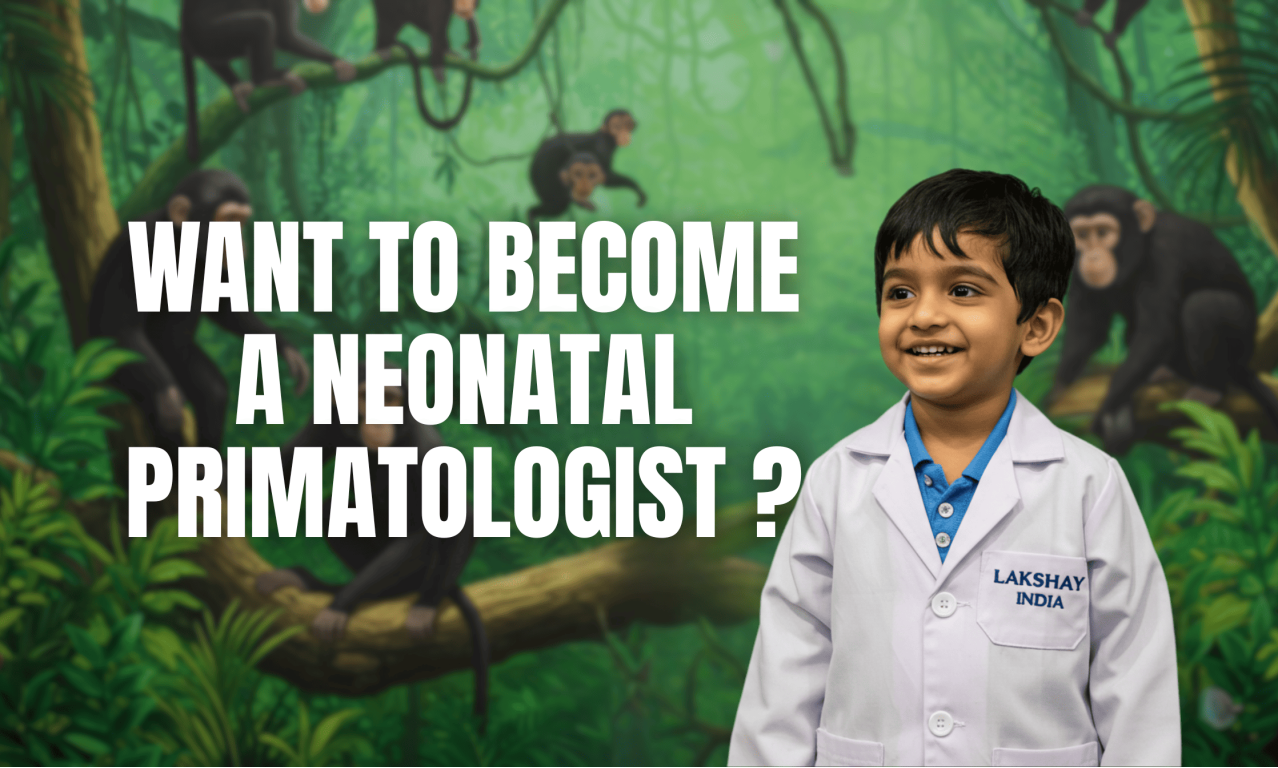Neonatal Primatologist

Who is a Neonatal Primatologist?
A Neonatal Primatologist is a specialist in the care, study, and conservation of newborn primates (such as monkeys, chimpanzees, gorillas, and lemurs) in both wild and captive environments. They combine the knowledge of primatology, neonatology, zoology, and veterinary science to monitor the health, development, nutrition, and social behavior of infant primates—often in rehabilitation centers, research labs, zoos, or conservation sites.
Step-by-Step Guide to Become a Neonatal Primatologist in India
1. Schooling (Class 8–12)
Subjects to Focus: Biology, Chemistry, Environmental Science, English
Olympiads/Exams: Biology Olympiads, NTSE, Wildlife Quiz Contests
Lakshay India Support: Early guidance through wildlife camps, primate behavior study programs, conservation clubs, and interaction with animal scientists
2. Bachelor’s Degree (3 Years)
Preferred Programs:
-
B.Sc in Zoology / Life Sciences / Animal Biology
-
B.V.Sc (Bachelor of Veterinary Science) – for veterinary track
-
B.Sc in Wildlife Sciences
Top Indian Institutes:
-
Delhi University (Zoology Hons.)
-
St. Xavier’s College, Mumbai (Life Sciences)
-
Indian Veterinary Research Institute (IVRI)
-
Wildlife Institute of India (WII), Dehradun
Lakshay India Support: Guidance for CUET/ICAR entrance exams, college selection, and project mentorship in animal behavior
3. Master’s Degree in Primatology / Wildlife Sciences (2 Years)
Specializations:
-
M.Sc in Primatology / Animal Behavior / Wildlife Biology
-
M.V.Sc in Veterinary Pediatrics / Zoo Animal Health
Top Global Programs:
-
Central Washington University (USA – Primate Behavior Program)
-
Kyoto University (Japan – Primate Research Institute)
-
University of Oxford (UK – Wildlife Conservation)
-
University of Wisconsin-Madison (USA – Primate Biology)
Lakshay India Support: Support for M.Sc/M.V.Sc admissions, SOPs, recommendation letters, scholarships, and global fellowships in primate research
4. Field Research & Neonatal Primatology Focus (2–5 Years)
Gain Experience Through:
-
Internships in primate rehabilitation centers or rescue sanctuaries
-
Field work in neonatal care of monkeys, apes, or lemurs
-
Collaborations with veterinarians, ethologists, conservationists
Indian Field Exposure:
-
WII Dehradun
-
Agumbe Rainforest Research Station
-
Assam State Zoo / Mysuru Zoo
Global Research Opportunities: -
Jane Goodall Institute
-
Duke Lemur Center (USA)
-
Gombe Stream Research Center (Tanzania)
Lakshay India Support: Field project guidance, safety training, research documentation, international research grant assistance
5. Progress to Specialist / Chief Neonatal Primatologist (6–10+ Years)
Responsibilities:
-
Monitor and treat health issues in newborn primates
-
Ensure neonatal nutrition, behavioral development, and immune support
-
Coordinate with veterinary staff and primate caregivers
-
Lead neonatal care protocols in zoos, rescue centers, or conservation units
Lakshay India Support: Career path mapping, field mentorship, leadership skills in wildlife programs, and conservation policy exposure
How to Get a Job as a Neonatal Primatologist in Global Organizations
1. Obtain Advanced Education or Research Fellowship Abroad
Top Fellowships:
-
Fulbright Fellowship (Wildlife Sciences)
-
DAAD Fellowship (Germany – Primate Studies)
-
Primate Conservation Inc. Grants
-
Leakey Foundation Research Fellowship
Lakshay India Support: Fellowship applications, research proposal writing, LOR and visa support
2. Join International Primate and Conservation Institutes
Organizations:
-
Jane Goodall Institute (Global)
-
Max Planck Institute (Germany)
-
Smithsonian Primate Research Center (USA)
-
Dian Fossey Gorilla Fund (Africa)
-
International Primate Protection League
-
National Primate Research Centers (USA, Japan)
3. Present at Global Primate Research Conferences
Events:
-
International Primatological Society (IPS)
-
Society for Conservation Biology
-
World Association of Zoos and Aquariums (WAZA)
Lakshay India Support: Conference abstract assistance, sponsorship strategies, research mentoring
Top Global Organizations Hiring Neonatal Primatologists
-
Jane Goodall Institute
-
Duke Lemur Center (USA)
-
Smithsonian Institution (USA)
-
Max Planck Institute for Evolutionary Anthropology (Germany)
-
Dian Fossey Gorilla Fund (Rwanda)
-
UN Environmental Programme (Wildlife Division)
-
World Wildlife Fund (WWF)
-
African Wildlife Foundation
-
Zoos with advanced neonatal primate care units (e.g., San Diego Zoo, Singapore Zoo)
Highest Global Annual Packages (INR Equivalent)
| Organization / Role | Global Salary Range (INR/year) |
|---|---|
| Max Planck Institute | ₹1.8 Cr – ₹2.8 Cr |
| Smithsonian Primate Research Unit | ₹1.5 Cr – ₹2.5 Cr |
| Jane Goodall Institute | ₹1.2 Cr – ₹2 Cr |
| Duke Lemur Center / Wildlife NGOs | ₹1 Cr – ₹1.8 Cr |
| Zoo-Based Neonatal Programs (USA, EU) | ₹1.4 Cr – ₹2.2 Cr |
Key Skills Required
-
Neonatal Primate Health Monitoring
-
Infant Behavior Analysis and Bonding Observation
-
Wildlife First Aid & Veterinary Assistance
-
Nutrition and Immunology in Primates
-
Field Data Collection & Documentation
-
Primate Disease Prevention (Zoonotic Focus)
-
Research Writing and Grant Application
-
Emotional Intelligence and Crisis Response in Animal Care
How Lakshay India Supports Aspiring Neonatal Primatologists
Early Discovery & Wildlife Passion Mapping (Class 8 onwards):
Biodiversity clubs, primate care simulations, interaction with animal biologists, and eco-camps
Zoology/Veterinary Track Guidance:
Support for admission into B.Sc, B.V.Sc, and wildlife-focused UG/PG programs in India and abroad
Project Mentorship & Field Training:
Hands-on training in neonatal handling, animal behavior journals, and field visits to primate conservation centers
Global Fellowship & Conservation Career Track:
Support in applying to Jane Goodall Institute, Fulbright, and other wildlife research fellowships
Lakshay India Wildlife & Primate Leadership Program:
A specialized track empowering India’s next generation of conservationists and neonatal primatologists through research mentorship, field exposure, and international collaborations
-914x546.png)



-1278x768w.png)

-1278x768w.png)


-1278x768w.png)
-1278x768.png)
-1278x768w.png)
-1278x768w.png)
-1278x768w.png)